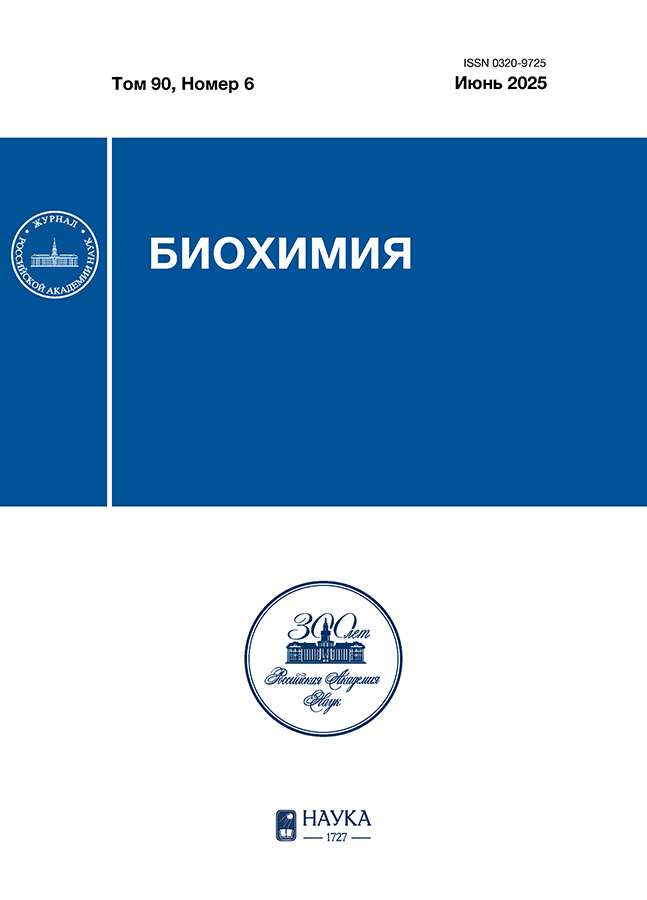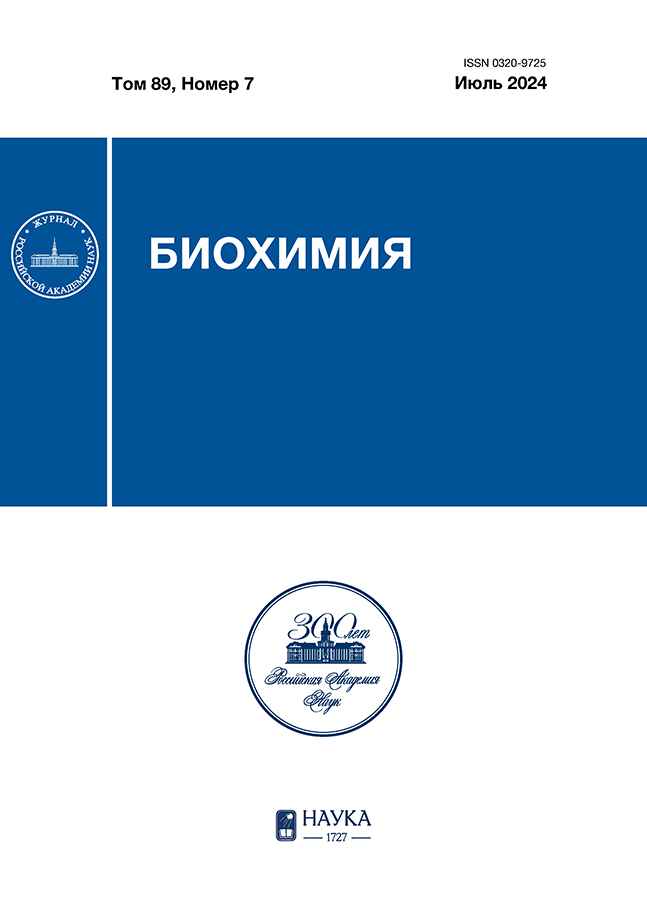The Mechanism of Stimulation of Myogenesis under the Action of Succinic Acid Through the Succinate Receptor SUCNR1
- Authors: Abalenikhina Y.V.1, Isaeva M.O.1, Mylnikov P.Y.1, Shchulkin A.V.1, Yakusheva E.N.1
-
Affiliations:
- Ryazan State Medical University
- Issue: Vol 89, No 7 (2024)
- Pages: 1276-1287
- Section: Articles
- URL: https://genescells.com/0320-9725/article/view/676575
- DOI: https://doi.org/10.31857/S0320972524070102
- EDN: https://elibrary.ru/WMLQXO
- ID: 676575
Cite item
Abstract
In a study on cells of the C2C12 line, the effect of succinic acid on the processes of myogenesis was studied. In the concentration range of 10-1000 microns, succinic acid stimulated the process of myogenic differentiation, increasing the number of myogenesis factors MyoD (at all stages of myogenesis) and myogenin (at the stage of terminal differentiation). The Western blot method revealed specific succinate receptors SUCNR1 in C2C12 cells, the level of which decreased during myogenesis. When succinic acid was added to cells, the level of intracellular succinate did not change significantly and decreased during myogenic differentiation. Using a specific Gai protein inhibitor, pertussis toxin, it was found that stimulation of myogenesis of C2C12 under the action of succinic acid is realized through SUCNR1–Gai.
Keywords
Full Text
About the authors
Yu. V. Abalenikhina
Ryazan State Medical University
Author for correspondence.
Email: abalenihina88@mail.ru
Russian Federation, Ryazan
M. O. Isaeva
Ryazan State Medical University
Email: abalenihina88@mail.ru
Russian Federation, Ryazan
P. Yu. Mylnikov
Ryazan State Medical University
Email: abalenihina88@mail.ru
Russian Federation, Ryazan
A. V. Shchulkin
Ryazan State Medical University
Email: abalenihina88@mail.ru
Russian Federation, Ryazan
E. N. Yakusheva
Ryazan State Medical University
Email: abalenihina88@mail.ru
Russian Federation, Ryazan
References
- Xu, M., Chen, X., Chen, D., Yu, B., Li, M., He, J., and Huang, Z. (2020) Regulation of skeletal myogenesis by microRNAs, J. Cell. Physiol., 235, 87-104, https://doi.org/10.1002/jcp.28986.
- Arnold, H. H., and Braun, T. (1996) Targeted inactivation of myogenic factor genes reveals their role during mouse myogenesis: a review, Int. J. Dev. Biol., 40, 345-353.
- Lassar, A. B., Skapek, S. X., and Novitch, B. (1994) Regulatory mechanisms that coordinate skeletal muscle differentiation and cell cycle withdrawal, Curr. Opin. Cell Biol., 6, 788-794, https://doi.org/10.1016/0955-0674(94)90046-9.
- Cuenda, A., and Cohen, P. (1999) Stress-activated protein kinase-2/p38 and a rapamycin-sensitive pathway are required for C2C12 myogenesis, J. Biol. Chem., 274, 4341-4346, https://doi.org/10.1074/jbc.274.7.4341.
- Buckingham, M., and Vincent, S. D. (2009) Distinct and dynamic myogenic populations in the vertebrate embryo, Curr. Opin. Genet. Dev., 19, 444-453, https://doi.org/10.1016/j.gde.2009.08.001.
- Arneson-Wissink, P. C., Hogan, K. A., Ducharme, A. M., Samani, A., Jatoi, A., and Doles, J. D. (2020) The wasting-associated metabolite succinate disrupts myogenesis and impairs skeletal muscle regeneration, JCSM Rapid Commun., 3, 56-69, https://doi.org/10.1002/rco2.14.
- Fredriksson, R., Lagerström, M. C., Lundin, L.-G., and Schiöth, H. B. (2003) The G-protein-coupled receptors in the human genome form five main families. Phylogenetic analysis, paralogon groups, and fingerprints, Mol. Pharmacol., 63, 1256-1272, https://doi.org/10.1124/mol.63.6.1256.
- Wang, T., Xu, Y. Q., Yuan, Y. X., Xu, P. W., Zhang, C., Li, F., Wang, L. N., Yin, C., Zhang, L., Cai, X. C., Zhu, C. J., Xu, J. R., Liang, B. Q., Schaul, S., Xie, P. P., Yue, D., Liao, Z. R., Yu, L. L., Luo, L., Zhou, G., Yang, J. P., He, Z. H., Du, M., Zhou, Y. P., Deng, B. C., Wang, S. B., Gao, P., Zhu, X. T., Xi, Q. Y., et al. (2019) Succinate induces skeletal muscle fiber remodeling via SUCNR1 signaling, EMBO Rep., 9, e47892, https://doi.org/10.15252/embr.201947892.
- Abdelmoez, A. M., Dmytriyeva, O., Zurke, Y. X., Trauelsen, M., Marica, A. A., Savikj, M., Smith, J. A. B., Monaco, C., Schwartz, T. W., Krook, A., and Pillon, N. J. (2023) Cell selectivity in succinate receptor SUCNR1/GPR91 signaling in skeletal muscle, Am. J. Physiol. Endocrinol. Metab., 324, E289-E298, https://doi.org/10.1152/ajpendo.00009.2023.
- He, W., Miao, F. J., Lin, D. C., Schwandner, R. T., Wang, Z., Gao, J., Chen, J. L., Tian, H., and Ling, L. (2004) Citric acid cycle intermediates as ligands for orphan G-protein-coupled receptors, Nature, 429, 188-193, https://doi.org/10.1038/nature02488.
- Gilissen, J., Jouret, F., Pirotte, B., and Hanson, J. (2016) Insight into SUCNR1 (GPR91) structure and function, Pharmacol. Ther., 159, 56-65, https://doi.org/10.1016/j.pharmthera.2016.01.008.
- Harden T. K., Waldo G. L., Hicks S. N., and Sondek J. (2011) Mechanism of activation and inactivation of Gq/phospholipase C-β signaling nodes, Chem. Rev., 10, 6120-6129, https://doi.org/10.1021/cr200209p.
- Yaffe, D., and Saxel, O. (1977) A myogenic cell line with altered serum requirements for differentiation, Differentiation, 7, 159-166, https://doi.org/10.1111/j.1432-0436.1977.tb01507.x.
- Sin, J., Andres, A. M., Taylor, D. J., Weston, T., Hiraumi, Y., Stotland, A., Kim, B. J., Huang, C., Doran, K. S., and Gottlieb, R. A. (2016) Mitophagy is required for mitochondrial biogenesis and myogenic differentiation of C2C12 myoblasts, Autophagy, 12, 369-380, https://doi.org/10.1080/15548627.2015.1115172.
- Исаева М. О., Гаджиева Ф. Т., Абаленихина Ю. В., Щулькин А. В., Якушева Е. Н. (2023) Способ культивирования и механизмы регуляции этапов миогенеза клеточной линии С2С12, Российский медико-биологический вестник им. академика И.П. Павлова, 4, 525-534, https://doi.org/10.17816/PAVLOVJ375362.
- Буев Д. О., Емелин А. М., Яковлев И. А., Деев Р. В. (2020) Культивирование миобластов и миосателлитоцитов in vitro, Наука молодых (Eruditio Juvenium), 1, 86-97, https://doi.org/10.23888/HMJ20208186-97.
- Sundström, L., Greasley, P. J., Engberg, S., Wallander, M., and Ryberg, E. (2013) Succinate receptor GPR91, a Gα(i) coupled receptor that increases intracellular calcium concentrations through PLCβ, FEBS Lett., 15, 2399-2404, https://doi.org/10.1016/j.febslet.2013.05.067.
- Емелин А. М., Буев Д. О., Слабикова А. А., Яковлев И. А., Деев Р. В. (2019) Количественная оценка миогенной дифференцировки клеточной линии С2С12 с использованием полиэтиленгликоля и индуцированных сред in vitro, Гены Клетки, 14, 87.
- Sestili, P., Barbieri, E., Martinelli, C., Battistelli, M., Guescini, M., Vallorani, L., Casadei, L., D’Emilio, A., Falcieri, E., Piccoli, G., Agostini, D., Annibalini, G., Paolillo, M., Gioacchini, A. M., and Stocchi, V. (2009) Creatine supplementation prevents the inhibition of myogenic differentiation in oxidatively injured C2C12 murine myoblasts, Mol. Nutr. Food Res., 9, 1187-1204, https://doi.org/10.1002/mnfr.200800504.
- Bradford, M. M. (1976) A rapid and sensitive method for the quantitation of microgram quantities of protein utilizing the principle of protein-dye binding, Anal. Biochem., 72, 248-254, https://doi.org/10.1006/abio.1976.9999.
- Kohout, T. A., and Lefkowitz, R. J. (2003) Regulation of G protein-coupled receptor kinases and arrestins during receptor desensitization, Mol. Pharmacol., 1, 9-18, https://doi.org/10.1124/mol.63.1.9.
- Vercellino, I., and Sazanov, L. A. (2022) The assembly, regulation and function of the mitochondrial respiratory chain, Nat. Rev. Mol. Cell Biol., 2, 141-161, https://doi.org/10.1038/s41580-021-00415-0.
- Locht, C., and Antoine, R. (1995) A proposed mechanism of ADP-ribosylation catalyzed by the pertussis toxin S1 subunit, Biochimie, 5, 333-540, https://doi.org/10.1016/0300-9084(96)88143-0.
- Najimi, M., Gailly, P., Maloteaux, J. M., and Hermans, E. (2002) Distinct regions of C-terminus of the high affinity neurotensin receptor mediate the functional coupling with pertussis toxin sensitive and insensitive G-proteins, FEBS Lett., 1-3, 329-333, https://doi.org/10.1016/s0014-5793(02)02285-8.
- Siow, N. L., Choi, R. C. Y., Cheng, A. W. M., Jiang, J. X. S., Wan, D. C. C., Zhu, S. Q., and Tsim, K. W. K. (2002) A Cyclic AMP-dependent pathway regulates the expression of acetylcholinesterase during myogenic differentiation of C2C12 cells, J. Biol. Chem., 39, 36129-36136, doi: 10.1074/jbc.M206498200.
- Kitzmann, M., Vandromme, M., Schaeffer, V., Carnac, G., Labbé, J. C., Lamb, N., and Fernandez, A. (1999) cdk1- and cdk2-mediated phosphorylation of MyoD Ser200 in growing C2 myoblasts: role in modulating MyoD half-life and myogenic activity, Mol. Cell. Biol., 19, 3167-3176, https://doi.org/10.1128/MCB.19.4.3167.
Supplementary files



















